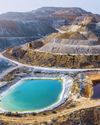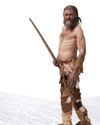
In a steamy rainforest, an orangutan scales a tree, gripping and grabbing with fingers and toes. Palm fronds rustle. At the top, it uses its teeth and hairy hands to rip away the bark, revealing the ivory-colored center, the “heart of the palm.” High in the sky, the creature crunches on the tender stalk.
In a field nearby, Serge Wich, biologist, ecologist, and professor at Liverpool John Moores University in England, is studying orangutans. Wich and his colleague, Lian Pin Koh, are working in Sumatra, an Indonesian island in Asia. They’re running a series of tests with one of the first drones ever used to study wildlife. It’s 2011, and drones aren’t yet common. They cobbled this one together from spare parts. They need to count orangutan nests to monitor the population, and they’re hoping this drone can help.
Why Study Orangutans?
These shaggy apes face many threats. They live in tropical rainforests on Sumatra and Borneo, but the lush forests are under siege. Agriculture, mining, logging, and palm oil plantations are destroying and dividing the land. Palm oil is found in many foods and products you use, like chocolate, potato chips, and soap. Orangutans eat mainly fruit, but loggers prize the hardwood from these trees.
The apes are also hunted. “They wander into gardens or onto palm oil plantations,” says Wich. “People don’t want them there, so they kill them. On both islands, they still eat them on occasion.” Every year since 1990, the number of orangutans has declined by several thousand.
Esta historia es de la edición April 2024 de Muse Science Magazine for Kids.
Comience su prueba gratuita de Magzter GOLD de 7 días para acceder a miles de historias premium seleccionadas y a más de 9,000 revistas y periódicos.
Ya eres suscriptor ? Conectar
Esta historia es de la edición April 2024 de Muse Science Magazine for Kids.
Comience su prueba gratuita de Magzter GOLD de 7 días para acceder a miles de historias premium seleccionadas y a más de 9,000 revistas y periódicos.
Ya eres suscriptor? Conectar

A 12-Year-Old Girl's Election Sticker Is a Winner
VOTING IS A FUNDAMENTAL FREEDOM FOR AMERICANS, A MEANS OF DOING ONE'S CIVIC DUTY AND A WAY AN INDIVIDUAL CAN EXPRESS THEIR VOICE. In 1971, the United States lowered its voting age to 18. But that doesn't mean kids and teens under 18 can't participate in elections in various ways.

If everything the human brain does is basically sets of electrical impulses, how exactly does that translate into a state of mind?
You're not the only one asking this question. Every neuroscientist in the world is wondering the exact same thing, says Zach Mainen

EARTH'S TINIEST BUILDERS
THE HIDDEN WORLD OF MICROBES IN THE EARTH'S CRUST

MUMMIES SPEAK
ABOUT MICROBES, MIGRATION, AND MORE

GOING WITH YOUR GUT
HOW DO MICROBES AFFECT OUR HEALTH? LET'S COUNT THE WAYS...

BUG Detective
A burglar sneaks into a house on a quiet street in New York City. He walks through the house, touching countertops and door handles. Finally, he steals a single card from a full deck. Then he leaves.

Little Creatures Among Us THE MANY MICROBES IN OUR DAILY LIVES
When you think you're alone, you're actually not. In the ground, the air, your room, and even your body are Strillions and trillions of creatures so tiny you can't see them.

A Mars Rock Found With Leopard Spots Could Be a Sign of Ancient Life
IN JULY, NASA'S PERSEVERANCE ROVER CAME ACROSS A SPOTTED ROCK IN WHAT WAS ONCE A RIVERBED IN THE JEZERO CRATER ON MARS.

Para Athlete Uses Exoskeleton Suit to Carry the Olympic Torch
In July, a 36-year-old French tennis para athlete, Kevin Piette, got a chance to participate in this summer’s Olympic torch relay without using a wheelchair.

Ancient Egyptians May Have Used a Water System to Lift Stones to Build Pyramid
HOW ANCIENT EGYPTIANS BUILT THE MASSIVE PYRAMIDS IN EGYPT MORE THAN 4,000 YEARS AGO HAS LONG BEEN A TOPIC OF WONDER AND DEBATE.
